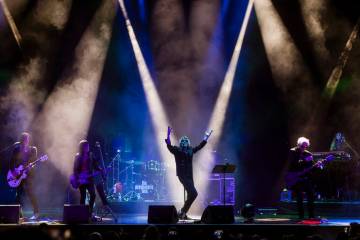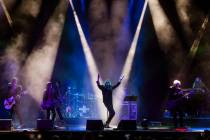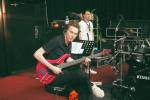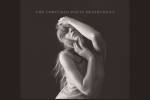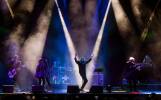Fleming packs emotional wallop in Smith Center recital
Soprano Renee Fleming filled Reynolds Hall at The Smith Center on Thursday with her incomparable voice and her infectious personality.
Even though she is without question the reigning diva of the opera world, her varied program on Thursday was built on Art Songs with no opera aria to be heard until it was time for an encore. Even so, this remarkable performer demonstrated facility in both drama and comedy, but mostly in audience rapport, with or without music.
She made her entrance in an elegant gold gown, acknowledged the audience and began to sing Mozart’s “Nehmt meinen Dank,” a quiet and non-demanding little song that alerted everyone that we were in for something very special. The remainder of the evening proved that to be true.
In addition to Mozart the first group contained arias from two oratorios by George Frederic Handel: “To Fleeting Pleasures Make Your Count” from “Samson” and “Endless Pleasures” from “Semele.” The first turns the singer into a vamp, the second was somewhat more sensuous and brooding.
The second group offered two works by Serge Rachmaninoff, “Twilight” and the haunting “Spring Waters.” Each drew credit for pianist Richard Bado whose service as accompanist was more than that, he was a full and valuable collaborator here and throughout the evening. Separating the Rachmaninoff works was a jewel by Antonin Dvorak titled “Songs My Mother Taught Me.” I would be hard pressed to pick a “best performance” but this beautiful and intense work would certainly be high on the list.
French composer Joseph Canteloube composed his 12 “Songs from the Auvergne” in the 1920s. Three appeared on Thursday night’s program. Fleming played the coquette in one, even daring to lift her skirt and, (gasp), display some well-turned ankle.
Following intermission Fleming turned to the composer with whose songs she became identified early in her career and whom she champions, Richard Strauss. His “Standchen” flowed effortlessly and seems to be second nature to her as do his many other songs and operas. Wagner’s “Traume” produced some truly breathless moments and the audience was reluctant to break the spell.
Then came another relief from intensity: Kurt Weill’s “Foolish Heart.” While its text portrays an account of a love affair gone bad, Fleming injected a lightness, even a lilt to the piece. It was another crowd-pleaser, one of many. And she makes it sound so easy! The group ended with a most suitable, but seldom heard, paean to Vienna, “Frag mich oft” (“Often Wonder”) by Johann Strauss II and Erich Korngold. The Straussian waltz rhythm and melody are unmistakable and paint a clear picture of Vienna, even for those who have never been there.
The printed program closed with three works from the American musical stage by Rodgers and Hammerstein: “The Sound of Music,” “Hello Young Lovers” and “Wonderful Guy.” One audience member was heard saying, “Typical Renee — fast, flirty and fun.”
Then came the encores. The first was what Fleming referred to as her favorite operatic aria, one that she performs on virtually every recital: the exquisite “Oh mio babbino caro” from Puccini’s “Gianni Schicci.” Then the surprise closer, Leonard Cohen’s “Hallelujah.” Even in a shortened version this song can — and did — pack an emotional wallop, especially when not sung but caressed by an artist of Fleming’s superb capabilities.
She seemed to be backing off some of the dynamic demands, especially extreme pianissimos, most likely due to suffering some vocal strain over the past few days. On doctors’ orders she was restricted from even talking. In light of that this world-class artist’s incredible performance was even more impressive and, well, sensational.
REVIEW
Who: Renee Fleming in recital
Where: Reynolds Hall at The Smith Center for the Performing Arts
When: Thursday, May 1
Grade: A+






